There are so many inspiring stories to tell when it comes to the world of music. Many which have been told, there perhaps still some out there a bit obscure, but no less fascinating. One of these tales would have to be of American born Singer-Songwriter Peggy March. Famously recognized for her mega 1963 hit “I Will Follow Him,” March would go on to become the youngest female artist to have a U.S. chart-topping single. Only 15 years old at the time, to this day, her record still stands for the Billboard Hot 100 charts.
Extremely impressive, the song became a massive hit worldwide, but while many Americans think this was it for Peggy March, do not realize she would go onto many decades of colorful success abroad. Known and beloved in places like Italy, Germany, and Japan, March has recorded consistently in various languages, thus sustaining herself as an international star. Still performing to this day, and loving every moment of it, an energized Peggy March recently sat down to talk about her career in music, the phenomenon of “I Will Follow Him,” her vast life experiences, plus much more.
Cryptic Rock – You have had a very long career in music that has lasted over six decades now. Obviously, you had tremendous success in the United States at a young age. Then you moved on to find success in the European market as the years wore on. Before we dive deeper into everything, how would you describe this really incredible journey that you have been on?
Peggy March – Well, first of all, who’d have thunk it? I started singing very young, but most singers do that. I was in all kinds of shows at home. I had singing lessons, but it was more like coaching. I started that at a very young age. I got involved in contests in the Philadelphia area for the Police Athletic League.
I eventually was discovered at my cousin’s wedding. The man who started my career basically married into my family. He approached my father and said, “I’d really like to do something with this young person.” My father said, “Absolutely not. She’s way too young.” I was 12 at the time. I really wanted to continue singing; it was all I ever wanted to do in my life. My dad and I sat down and I really begged and begged, “Let’s try this. Let’s try that” kind of thing. Suddenly I was making demos. I did TV in the Philadelphia area also. It was not unknown to me, basically. It was not a surprise either. It was something I really wanted to do and I liked doing. I used to sing around the Philadelphia area on Saturdays with a Country Western band on the weekends in places like Doylestown and around the area.
I don’t know what convinced dad to say, “Okay,” but I did. We made demos and eventually got to RCA. I didn’t know this man well; he was from the Philadelphia area, in fact, he was from my hometown. He got me to RCA though. I got an audition and my piano player did not show up. He was someone who had been arranged to play for me to do this audition for Hugo & Luigi. They were very successful at the time, producing The Tokens, and The Tokens had a couple of well-known hits. Anyway, he did not show up, so therefore I had to sing a cappella. That was not a big deal for me. I did it and signed a contract that particular day. They didn’t like my name; my maiden name is of course Italian. They asked me, “When’s your birthday?” I said, “March.” Well, I became Peggy March. Then we went into the studio. RCA was an international label, and because they were, their executives would send me all over the place. I had a good ear for language, and I started singing in everything from German, Spanish, Italian, Japanese, to Dutch.
Of course, “I Will Follow Him” was a catalyst for getting me everywhere. When it became number one in The States, it went on to be number one in Japan in Japanese. Then I traveled there for a while and did a lot of television there for a while. Then people were writing for me as well as in Italian. Ennio Morricone was my producer at a specific time; way before he was extremely popular and before he became an icon.
It was an interesting thing. I loved traveling and I had always wanted to do that anyway. I was just having a grand time! I had recorded “I Will Follow Him” at the age of 14, and by the time it first went to number one, I had turned 15. I traveled everywhere… it was great and I loved it! I did not necessarily love being away from home, but I just loved meeting new people and seeing new places. The other countries basically adopted me. I became a domestic artist in Italy, Germany, and in Japan, specifically. I performed in those countries all the time too, so I was never in school.
I just got to have an international career… which few people really know about. Once “I Will Follow Him” was established, and I recorded a couple of other things for RCA, the other careers became bigger. The Japanese career went on for quite some time, the German career is still going on , and the Italian career, I did that for about five to six years. It did not get to be too much, because my music was fizzling out if you will. I was concentrated on two different continents, mainly Asia, in Japan, and Europe, in Germany, as well as parts of The States. It was odd, but I really loved it and I was having a grand time!
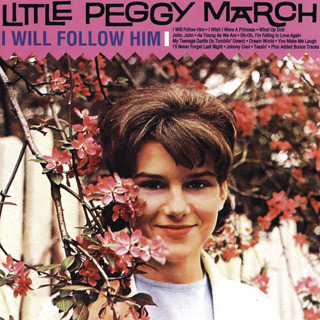
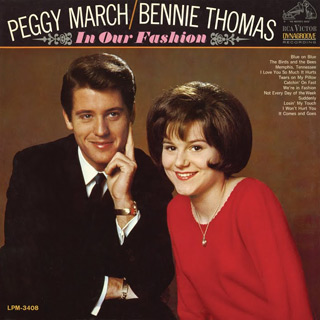
Cryptic Rock – Wow. It is really fascinating to hear how it all transpired for you from where it started here in the USA at a young age and where it went to. You mentioned how you were 14 when you recorded “I Will Follow Him.” That became a number one hit when you were 15; making you the youngest female artist to have a number one hit. You had a lot of success with that, and you pioneered a lot of things with that one song alone.
Peggy March – Oh, yeah. Very much so. Again, it started my career, but it brought me to other places, and everybody got to do that. Yes, a couple of artists did record in different languages. In fact, even Elvis recorded in German. Nobody stayed in those countries though, and nobody had a domestic career in those countries, like Japan or Germany, but I did. The Germans practically adopted me, and Japan did also. It was very interesting. Obviously when looking back on it, it was very odd and different from anything else. I don’t think there’s anyone out there that had a career like this one. I’m still working, thank God, and I’m enjoying every minute of it.
Cryptic Rock – It is really inspiring to see that you are still going strong. You are very busy too. To this day you still do a lot of live shows abroad.
Peggy March – I still record in German. I have a new single coming out there. I still tour in Germany; I recently toured there until the end in May. I then go back, and then I come home and do things here in the US. I’m on two cruises next year. I’m just extremely lucky. I’ve made a lot of friends in the business too. I opened for Don Rickles for a while when he was in Vegas. Just very diverse, different, and interesting for me in any case. I have loved every single second of it.
Cryptic Rock – It is truly really great. Not many people could say they can transcend as many decades as you have within music, plus continually recorded. You have recorded quite a few singles through the years in English, German, as well as other languages.
Peggy March – Right. Again, it’s not something we had planned. It’s just something that happened. It would be, “Are you free? We’re doing a tour all through Japan at this and this and this time and this year and so on.” We would say, “Sure.” So off we went. I got married at the age of 20. My husband was my manager at that time; because the first manager took all the money, or I always say borrowed it and never gave it back.
I wrote a book too. I was 75 last year, so this book was released in German and in Germany. It’s called I Will Follow Me as the English title. It’s basically my career, from the day I was born till now. People find it interesting, which is good. I was afraid it was going to be boring; because as far as I was concerned it was my life. That’s okay, and a good thing, but I couldn’t compare it with somebody else’s. I always thought I didn’t do enough. When I read the stuff, it was like, “Wow, I guess I did.” I did a lot. I don’t know if I ever did enough, but I did a lot.
Cryptic Rock – When you are working and doing what you love, sometimes you do not really reflect on it. You just continue to move forward.
Peggy March – Exactly. I think so anyway. Besides, if you’re doing what you love, it’s not a job. I loved to travel to different countries and I loved to be a tourist. That was always fun for me, and I still do that. My husband passed away 10 years ago, so I’m on my own, basically. They often pair me for these Rock-n-Roll soires. I’m one of the few females that’s still working, especially at my age. It’s okay, I just happen to like my job and I’m extremely lucky that I can do it.
Cryptic Rock – And you also have an energy and passion as well. As we have spoken of, you have had a tremendous career in the European market. The musical landscaping was changing in the ’60s after the earlier part of the decade, but do you ever look back in hindsight and think what might have been in America?
Peggy March – Of course. It’s so funny… you can’t change things. They are what they are. Who would have thought that the English invasion would have changed the face of music in the ’60s? It really did. Then it went into Folk, and then Folk Rock, and then it did this and that. I was no longer here, basically. As I said, I was married at the age of 20. Eventually we moved to Germany where I had a much bigger career. I was on the road 280 days a year. It was great; I was singing and doing my thing. From Germany, it was just as easy to get to Japan as it was every place else.
The music had changed, and that’s how it is. You can’t cry in your coffee… it really makes no sense. You just do what you can do and wherever the opportunities were, we just agreed to them, and went on from there. I did a musical in Germany when I was 30. From day to day, things changed, and that was okay. I talk with my colleagues in Germany about how the business was in the ’70s. It was wonderful in Germany then. It’s so different now with the technical stuff and whatnot, which is good, but it’s just not the same. You have to accept it, you have to go forward, use what you have today, and just go there. If you stay put, you atrophy. That’s not good. Staying put was never my thing anyway. It’s really fun as long as people know what they’re doing. I work with a lot of professionals in the business. It’s like, “Okay. Where do you want to go?” “Let’s see. Let’s do this.” “Okay!” And off I go!

Cryptic Rock – It also gives you a lot of life experience and stories to tell. Like you said, you have your book. Now, since you did have such a lengthy career in Germany, you lived there for a quite while, yes?
Peggy March – Yes, we lived there for about 12 years. Our daughter was born there. In the ’80s, we came back to The States. What a lot of Americans don’t know is during the Disco era, being acquainted with the German market and so on and so forth, there was a German producer, his name was Jack White. He is still alive, and he lives in Berlin. He was producing Laura Branigan. Anyway, he was in California at the same time I was and we had gotten together. I had put a band together, and we were writing. That’s what I really wanted to do in the ’80s. The business changed in Germany as well.
We said, “Okay, let’s go back to The States, because I’d like to write.” I speak German fluently, but they have a grammar thing, and it’s really sticky. If you don’t use the correct grammar, it doesn’t mean the same thing, so you have to be careful. Writing a lyric in German was not something I can do… it just isn’t. I can give you the idea and try to put it into words, and everybody understands me, but it’s not like writing a lyric, which has to be more exact. I wanted to write, so we came back to The States. We were doing a lot of writing. We had a showcase one night, and I said to Jack White, “Why don’t you come to my showcase.” He heard this song which we had written called “When the Rain Begins to Fall.” It was a Disco time, so it had that beat and feel. He went on to produce Pia Zadora and Jermaine Jackson. They did this as a duet, and this song went to number one all over Europe.
In fact, one of the K-pop bands did it recently and did a video on it, which turned out to be really good. This song also gets a resurgence all the time, every 10 years or so. I did have a number one as a writer, all through Europe and New Zealand. I also wrote an English lyric for Audrey Landers ; she had a number one in Germany also, in English. Like I said, it was pretty diverse and very cool.
I’m still writing today. I write for other people in Germany, especially if they want something in English. It pretty much stays there, but that’s okay. I get to use whatever talents I have. It’s fun for me to do that and I’m extremely thankful.
Cryptic Rock – You are multi-talented and not just a voice. It is wonderful you have songwriting credits too.
Peggy March – Well, that was a dream of mine to have a number one hit record, not sing it, and not be the performer, but be the writer. As bizarre as that may sound, I got that wish taken care of.
I had a big career during the ’70s; something like 14 hits in Germany. As the years went by, they forgot about “I Will Follow Him,” because it had happened so long ago. When Sister Act came out in 1992, Lou Christie called me up and said, “You have to go see this movie Sister Act.” We were back in The States at the time and I said, “Why?” He said, “Nah, just go see it and you’ll see right away.” Well, the opening song is, “I love him. I love him. I love him. Where he goes, I’ll follow.” Whoopi Goldberg was singing! I said, “Oh, wow, that’s cool!” It was used in both Sister Act films, which was also cool! Because of the success of that film worldwide, everybody thought it was a brand new song until it was put in the German papers “Oh, no. This came out originally in ’63, and it was the German Peggy, who they knew very well, who had a hit with it in the United States.”
People had forgotten that I was an American and all this. It was really interesting. To this day, now I do the song and it’s a huge success on stage. I do it all the time. It’s part of my act, as we say. It really introduced me to the recording business. With it, I was able to have a career, not just with that one song, but with more after that. I produced in Holland, Spain, Japan, and all over the place.
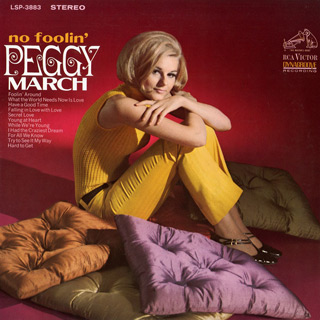

Cryptic Rock – That is so wild. It makes for a really compelling book too.
Peggy March – It’s in German! (Laughs) It has not been translated so far. I narrated the book to a writer in Germany, so I have a co-writer in a sense. The ideas are not hers, they’re mine. The speech is mine and the story is mine. I told her, “You can’t put German words in there that I would never use.” Germany’s a very correct language, with big words, and all this other stuff. I don’t use those; I use regular and ordinary vernacular. I said, “No, you have to write it like it’s me saying these things.” She said, “Okay, I get it.” The people, when they read it, they say, “Oh, this sounds exactly like Peggy.” That was very important to me.
It’s never been translated into English. I don’t know if it would be interesting here, but hey, if we find a publisher who’s willing to go for it, fine. A lot of my foreign stuff, nobody knows about this. I should say very few people do know about it; because it took up such a big chunk of my career when I just wasn’t here. The business had changed, the music had changed, everything had changed, but I was still going somewhere else. I was very fortunate that I was able to go somewhere else. I was loving it all and really having a great time. I never had one day job. This is it!
Cryptic Rock – That is not a bad job. You can’t get any better than that.
Peggy March – Certainly not. This year, I was on stage doing the tour for my birthday and the whole audience sang “Happy Birthday.” How bad can that be?
Cryptic Rock – Fantastic. Now, you did release your last album in English about 11 years ago in 2013, Always and Forever.
Peggy March – Exactly. An English couple came up to me and they said, “I love the way you sing in English. I want to produce another English album for you.” I said, “Oh, that’s great. Okay. How do we go about this?” He decided what he wanted to do. I said, “Well, I’ll only do this if I can write the lyrics.” He said, “Okay.” I wrote the lyrics. I really never expected him to say that, but he did. We had a young Danish boy who was writing the melodies. Technology, the way it is, he just sent the melodies over on an email, and then I started writing the lyrics.
We produced it vocally in Miami; because that’s right around the corner from where I was at the time. It was super and I was very proud of the production, music, lyrics, as well as the stories I was telling. I think you can still get it on Amazon, if I’m not mistaken. I loved the work. I wrote a song for my husband on there. “Always and Forever” actually was written for him. It’s one day after the other, and that’s fine with me. A new surprise every day, which is great.
Cryptic Rock – People should check it out for sure if they missed it. Now, beyond that, this year a newly released song called “It’s Not Over Yet.”
Peggy March – Yes, that is a song I wrote the lyric to and part of the melody. I did it then in both languages. I had to give the lyricist the German what I wanted, and then he was able to put it in the German language. It’s sort of mine. I said to him, “Do you think we can do this? Am I really part of the lyrics?” He said, “Absolutely.” The ideas were mine. It wasn’t a literal translation of the English, but it was the same idea. The whole idea of “It’s Not Over Yet” is like Elton John’s “I’m Still Standing.” That’s what I wanted to say with “It’s Not Over Yet,” is that I’m still standing.
As I said, there aren’t many in my age bracket who are still working and everywhere. “It’s Not Over Yet,” of course, it’s mine. I wanted to leave it in English. I told them, “Okay, we can do this in two languages.” Both songs are called “It’s Not Over Yet.” The one that’s in German has a German subtitle. It’s all about somebody not giving up. It’s just not over yet, period. I’m very proud of that. The rest of the songs are songs that were not released at any other time in Germany and a new single is on it as well for Germany, specifically. It’s in the German language. Most of it is in German, except for that one song. There is one called “Don’t Worry My Love,” but it has a German lyric and it only has an English title.
Cryptic Rock – Wonderful! Now people can find it on Spotify beyond the German market.
Peggy March – Yes. It’s out, but of course nobody really buys CDs anymore. They do a lot of downloads or streams. I don’t know where it’s being sold to tell you the truth. (Laughs) I do know that it’s being downloaded and we sell them at our concerts.The picture on it is nice. It’s a nice little CD and I like the songs a lot. I don’t give them over just to people anymore and say, “Here.” I have to approve them. At one time, I never did. There was always somebody else who did the approving. Now, of course, I do it all myself, in a sense, saying, “Okay. I like that. Can we change this line? I prefer that,” and so on and so forth. It became really important. At a young age, you really have very little to say. In the ’60s, anyway.
Cryptic Rock – That is understandable. The ’50s into the ’60s was really the birth of Rock-n-Roll. There were so many amazing pieces of music coming out at the time. There is sort of a romanticism with the whole idea of the ’60s and how special it is in the history of Rock-n-Roll. What was it like living it?
Peggy March – Well, I was a minor, so we have to go back to rules and regulations. A lot of the other kids, performing artists, and so on and so forth, who were also very young, a lot of them were teenagers, but nobody was as young as me. In the state of Pennsylvania, there’s a law called the Coogan Law. The Coogan Law does not allow parents to have access to any minor who’s earning a living and who’s getting money; whether it’s heredity or actually doing something.
The law was created because of Jackie Coogan. When he was a child actor, everybody knows him from that era, his parents took all his money, used all his money, and spent it all. By the time he became an adult, there was nothing left. They created this law called the Coogan Law to protect minors who were creative, or any kind of inheritance or earning possibilities.
I was then earning money, but I never saw it. I never touched it. I had no idea how much there was; none whatsoever, because I was a minor. My parents could not touch it and ask questions also; because the law did not allow them to do that. This law was only in the state of Pennsylvania and in California. Why Pennsylvania had this law, I never ever understood, nor did I ever find out.
I grew up. When I turned 16, I was going to buy a car and I’m going to buy a house for my parents and all that. I never saw a dime, ever. My mother was still buying my underwear and my school uniforms and all that. I never had anything. I didn’t have a pocket full of money. It was only by the time I turned 18 that I was able to sue this manager, Russ Smith, so that he had no control over me or my income at all anymore. I had to go to court. My mother swore that the judge, and the lawyer for Russ Smith, had no more control over me and/or my finances. It was only at that time when I turned 18 that I could do this. I was left with $500. That’s all that was left, or so he said. He declared bankruptcy immediately as he was walking out of the courtroom. That’s all I ever saw, was the $500. With worldwide sales and worldwide travel, I did TV, I did concerts, I did all kinds of things that I was probably being paid for, I never saw.
I had no idea how much money was lost. RCA had no control over it. I was still with RCA, of course. They had no control though. In fact, they told me years later, the executives in RCA came to me and said, “Well, how were those braces we got you?” I said, “What braces?” They said, “Oh, yeah. Russ Smith asked for $45,000 to get you braces.” He got the money, and I didn’t get the braces. Not that I needed them, but this is what he was doing all the time that I was performing and working, etc.
I had no idea this was going on until I was married; because my husband was asking questions and things of that nature. As he became my manager, he was allowed to ask all these questions. I got pretty much screwed like a lot of teenagers did at that time, but I had no idea that this was what was happening until I had turned 18. It was sad in a way. But again, I was working, and I was working in different countries. I was traveling quite a bit. All of this was going on around me, and all I did was nod my head, “Okay, let’s go. I’m fine. Let’s go.”
Finally, we moved to Germany. I became part of the German economy, if you will, because I became a German artist because we lived there. Everything I did was in Germany. I traveled twice a year to Japan, same thing happened, except I never learned Japanese. I sang it, but I never learned how to speak it.
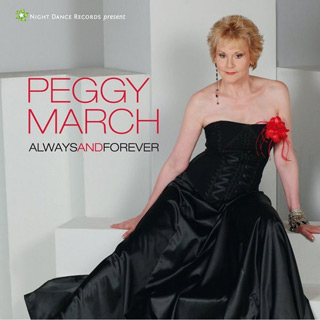

Cryptic Rock – Wow. That is a very tragic story.
Peggy March – Well, very much of the time it’s tragic. That’s water under the bridge though. What are you gonna do about that? The man is dead, and that’s the way it is. It brought me to this place. That can’t be that bad. I like where I am, so that’s not so bad.
Cryptic Rock – Right. There is no point in being bitter. People can be bitter and it just does not get you anywhere.
Peggy March – It doesn’t. It just gives you stomach aches. I was never like that. My mother was; because she didn’t like the fact that her daughter was being taken advantage of. There was nothing she could do about it though.
Cryptic Rock – It is really unfortunate. With your vast life experiences, what would be some of the most important things that you have learned from it all?
Peggy March – Everything. Do you really think about this? Or did you, perhaps, when you were five and say, “Okay, this is what I’m going to do?” No, this is what I was going to do. I was not an aggressive person. I needed people around me to talk about me, to be there and push and to do those things; which is necessary in this business. I was never like that. I would say I was extremely lucky. Really fortunate to have people around me, of course, not necessarily Smith who stole all the money. If it wasn’t for him, I wouldn’t have gone to RCA. There’s a silver lining here somewhere, and it’s okay.
It’s really not bad. I was never injured. I was never really hurt bodily or physically. All the other hurt was all monetarily. Believe me, a lot of that went on in the ’60s… a lot of it. So what was the most important? I don’t know. It’s a day-to-day thing. You have to be open to all kinds of opportunities, and I used to love it. I loved to travel! I don’t like it so much now, but I loved it then. Ten hours to Japan? Okay, let’s go! Ten hours to Frankfurt, Germany? All right, let’s do it! That’s the fastest way to get there. So, you sit in a plane for 10 hours and you get there and then you go about your business. That’s why I stay there for longer times; because it doesn’t make any sense to fly back. It just costs too much money, time, and energy.
My daughter is a wife, mother, she works and the whole thing. She certainly doesn’t need me anymore. My house doesn’t need me. There’s no one here. It’s fine, I just continue to do my thing. I’m extremely lucky too. I have people around me who care and who are working hard for my benefit. We work together. We’re having a great time, and the people are coming. This is what’s most important; you got an audience. As long as I can do this, I will continue to do this. Like I said, I’ve got two cruises that I know of next year here in The States. I’m going here, there, doing this, doing that. That’s really cool. I absolutely love it.
Cryptic Rock – Here is to you to continuing doing it in good health for as long as you wish.
Peggy March – Well, thank you. I do appreciate that. Again, one thinks about one’s age. It’s certainly not a given. Even though it’s a fun job, it is tiring. Let’s face it, one gets older and it takes longer to get from one place to the other, and it takes more air to get from one place to the other. Again, as long as I can, as long as I’m accepted, as long as people are asking for me, I’ll go. As I have said, consider myself extremely lucky and always have.



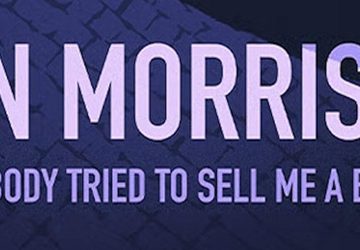


No comment